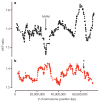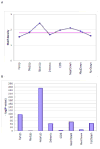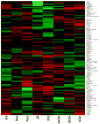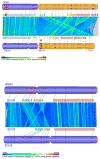The genome of a songbird
- PMID: 20360741
- PMCID: PMC3187626
- DOI: 10.1038/nature08819
The genome of a songbird
Abstract
The zebra finch is an important model organism in several fields with unique relevance to human neuroscience. Like other songbirds, the zebra finch communicates through learned vocalizations, an ability otherwise documented only in humans and a few other animals and lacking in the chicken-the only bird with a sequenced genome until now. Here we present a structural, functional and comparative analysis of the genome sequence of the zebra finch (Taeniopygia guttata), which is a songbird belonging to the large avian order Passeriformes. We find that the overall structures of the genomes are similar in zebra finch and chicken, but they differ in many intrachromosomal rearrangements, lineage-specific gene family expansions, the number of long-terminal-repeat-based retrotransposons, and mechanisms of sex chromosome dosage compensation. We show that song behaviour engages gene regulatory networks in the zebra finch brain, altering the expression of long non-coding RNAs, microRNAs, transcription factors and their targets. We also show evidence for rapid molecular evolution in the songbird lineage of genes that are regulated during song experience. These results indicate an active involvement of the genome in neural processes underlying vocal communication and identify potential genetic substrates for the evolution and regulation of this behaviour.
Figures















References
-
- Zann RA. The Zebra Finch: A Synthesis of Field and Laboratory Studies. Oxford Univ, Press; 1996.
-
- Nottebohm F. In: Hope For a New Neurology. Nottebohm F, editor. New York Academy of Science; 1985.
-
- Doupe AJ, Kuhl PK. Birdsong and human speech: common themes and mechanisms. Annu Rev Neurosci. 1999;22:567–631. - PubMed
Publication types
MeSH terms
Substances
Grants and funding
- R01 NS051820/NS/NINDS NIH HHS/United States
- R01 DC007218/DC/NIDCD NIH HHS/United States
- P30 DA018310/DA/NIDA NIH HHS/United States
- MC_U137761446/MRC_/Medical Research Council/United Kingdom
- HHMI/Howard Hughes Medical Institute/United States
- BB/E017509/1/BB_/Biotechnology and Biological Sciences Research Council/United Kingdom
- R01NS051820/NS/NINDS NIH HHS/United States
- R01 HG002939/HG/NHGRI NIH HHS/United States
- R01 NS045264/NS/NINDS NIH HHS/United States
- R01 GM59290/GM/NIGMS NIH HHS/United States
- U54 HG003079/HG/NHGRI NIH HHS/United States
- R01 GM085233/GM/NIGMS NIH HHS/United States
- BBE0175091/BB_/Biotechnology and Biological Sciences Research Council/United Kingdom
- BB/E010652/1/BB_/Biotechnology and Biological Sciences Research Council/United Kingdom
- BB/D013704/1/BB_/Biotechnology and Biological Sciences Research Council/United Kingdom
- BB/F007590/1/BB_/Biotechnology and Biological Sciences Research Council/United Kingdom
- BBS/E/I/00001425/BB_/Biotechnology and Biological Sciences Research Council/United Kingdom
- R01 GM059290/GM/NIGMS NIH HHS/United States
- BB/D013704/2/BB_/Biotechnology and Biological Sciences Research Council/United Kingdom
LinkOut - more resources
Full Text Sources
Molecular Biology Databases

